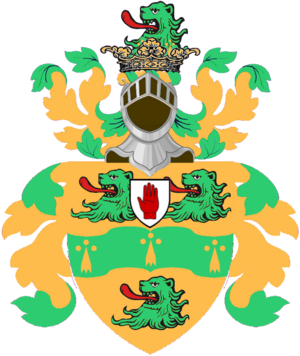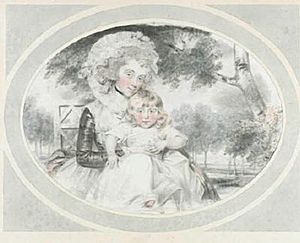Sir Stephen Lushington, 1st Baronet facts for kids
Sir Stephen Lushington, 1st Baronet (born 17 June 1744 – died 12 January 1807) was an important person in British history. He lived at South Hill Park in Easthampstead, Berkshire. Sir Stephen was a Member of Parliament, which means he helped make laws for the country. He also held a very important job as the leader, or Chairman, of the powerful East India Company.
Contents
Life Story
Stephen Lushington was the third son of Henry Lushington, who was a vicar (a type of priest) in Eastbourne.
Working with the East India Company
From 1782, Stephen Lushington became a director of the East India Company. This company was very powerful. It traded goods like tea and spices from India and even governed large parts of India. Stephen supported new ideas to change how the company was run. These ideas, proposed by a politician named Charles James Fox, aimed to put the company more under the control of the British Parliament.
Becoming a Member of Parliament
In 1783, a Member of Parliament named Christopher Atkinson was removed from his job because of a problem. This left an empty spot for the town of Hedon in Yorkshire. Hedon was a "rotten borough," which meant it was a place where it was easy for certain politicians to get elected. The Prime Minister, Portland, suggested Stephen Lushington for the job.
On 4 December 1783, the old MP was officially removed. A special election was planned for Hedon. However, the very next day, a new rule was added to the East India Bill. This rule said that people who helped run the East India Company could not also be Members of Parliament. Stephen had to choose between a job helping to run the company or being an MP. He knew that most of the East India Company directors did not like Fox's new bill, so he decided it was better to become an MP.
On 15 December, he was elected for Hedon without anyone running against him. But on that same day, something unexpected happened: the House of Lords (another part of Parliament) voted against Fox's East India Bill. This caused the government to fall apart.
Later Political Career
Stephen Lushington did not agree with the new government's plan for the East India Company. This new plan, called Pitt's India Act, gave control of the company to the King's government, not Parliament. In the election of 1784, he tried to become an MP for Hastings but did not win.
He later became the Deputy Chairman of the East India Company from 1789 to 1790. He was then the Chairman three times: from 1790 to 1791, 1795 to 1796, and 1799 to 1800. On 26 April 1791, he was given the special title of Baronet, which meant he became "Sir Stephen Lushington."
He returned to Parliament in 1790 as the Member for Helston. He remained an MP for the rest of his life, also representing other areas like Mitchell, Penryn, and Plympton Erle.
Family Life
In 1771, Stephen Lushington married Hester Boldero, who passed away in 1830. Hester's father gave the couple land in Aspenden and Berkesdon in Hertfordshire. The family lived at South Hill Park near Bracknell in Berkshire from 1787 to 1807.
Stephen and Hester had several children, including:
- Sir Henry Lushington (1775–1863), who became the next Baronet after his father.
- Sophia Lushington, who married Denzil Onslow.
- Stephen Lushington (1782–1873), who also became a Member of Parliament and later a judge.
- Charles Lushington (1785–1866), who worked for the government in Bengal (India) and later became an MP too.
- Hester Lushington.
|
 | Emma Amos |
 | Edward Mitchell Bannister |
 | Larry D. Alexander |
 | Ernie Barnes |



